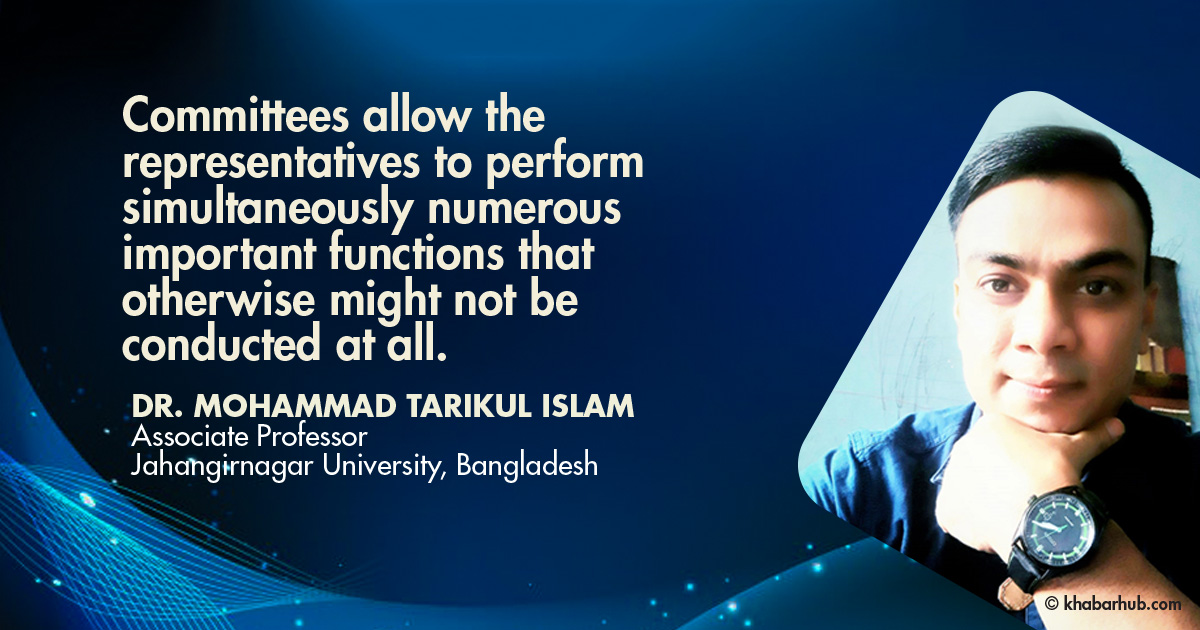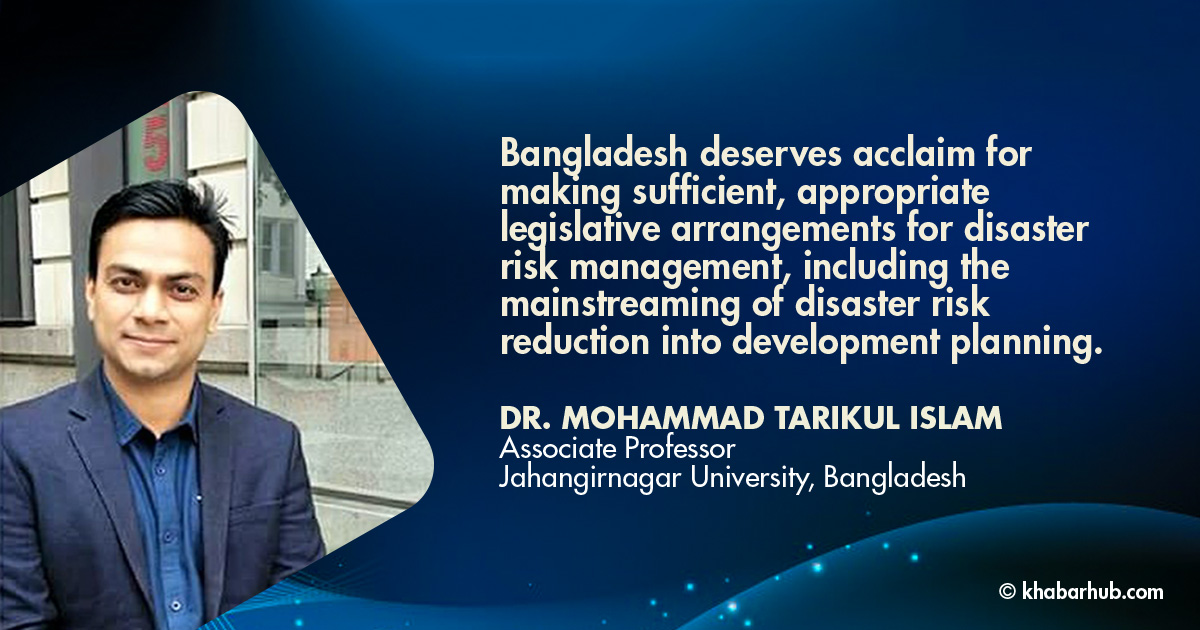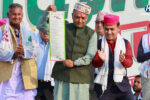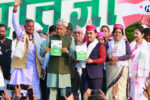KATHMANDU: Dr Mohammad Tarikul Islam is an Associate Professor of Government and Politics at Jahangirnagar University in Bangladesh.
He was the Visiting Research Fellow at the University of Oxford, the United Kingdom in 2018. Professor Islam is also the Visiting Scholar of the University of Cambridge.
Prior to joining University in 2014, Dr Islam was serving United Nations Development Programme Bangladesh for a period of seven years in different capacities.
Professor Islam has gained hands-on experiences while joining a brief mission at the UNDP country office in Indonesia, Nepal and China.
He is also a regular contributor to the South Asia Blog of London School of Economics and Political Science (LSE), UK, and the Institute of South Asian Studies, National University of Singapore.
He has more than 30 publications to his credit mostly appeared in the international outlet (Routledge, Elsevier, SAGE, Oxford, Springer, BJECC, and so on).
His edited book ‘Human Security, Peace and Development: South Asian Perspective’ was published from Kolkata, India in July 2018. He has participated in a number of lectures, seminars and workshops at Cambridge, LSE, SOAS, Oxford, and different universities in India and Nepal.
Prof. Islam acts as Research Guide to different courses (SSC and ACAD) at the Bangladesh Public Administration Training Centre.
His article regularly appears in the Daily Star, the Daily Independent, the Financial Express, the South Asia Monitor (India) and Khabarhub (Nepal).
His forthcoming book is ‘Local Government in Bangladesh: Contemporary Issues and Challenges’ from the Routledge. Professor Islam is currently working with two young scholars from the University of Oxford and the University of Leeds in an edited book “COVID-19 in South Asia: Its Impact on Society, Economics and Politics”.
Dr. Islam is the founder and administrator of the Local Government-Centre for Social Harmony and Development.
Khabarhub talked to Dr Tarikul on Citizen’s Participation in Local Government in South Asia. Excerpts
Briefly tell the legislative and institutional advancement of Disaster Management in Bangladesh.
Bangladesh is one of the most disaster-prone countries in the world with great negative consequences being associated with various natural and human-induced hazards.
The country has demonstrated its remarkable resilient capacities as a global champion in Disaster Management.
In an effort to professionalize Comprehensive Disaster Management Approach with particular focus on the integration of DRR into the development process, Bangladesh developed a National Plan for Disaster Management (NPDM) 2007-2015 as well as Disaster Management Act are the outcome of the national and international commitments of the Government of Bangladesh (GoB) and the Ministry of Food and Disaster Management and Relief (MoFDMR) for addressing the disaster risks comprehensively.
Besides, the revised Standing Orders on Disaster (SOD) is supposed to make the concerned persons understand and perform their duties and responsibilities regarding disaster management at all levels.
Bangladesh deserves acclaim for making sufficient, appropriate legislative arrangements for disaster risk management, including the mainstreaming of disaster risk reduction into development planning.
Nevertheless, in recent years’ various efforts have attempted to ‘leapfrog’ this obstacle by developing more forward-thinking plans of action and strategies, reflecting modern thinking around disaster risk management and, to some degree, embracing principles of mainstreaming.
If fully implemented, these plans and strategies could represent considerable progress in mainstreaming at both national and local levels.
Individual line agencies and local governments are legally responsible for implementing disaster management, as it is still commonly referred to in department circulars and executive orders, within their own areas of responsibility.

In practice, most of the local level disaster management committees, particularly UDMC risk reduction and mainstreaming capacity and capabilities are often very limited.
The NPDM, which runs from 2010-2015, does seek to integrate a ‘disaster preparedness and management strategy’ in the development planning process at all levels of government.
But this laudable goal is only set within the context of the environment and natural resources sector while the plan is even explicitly complacent about disaster risk in its discussion of the highly vulnerable agricultural sector.
The Disaster Management Act 2012 has been effective with a view to establishing an effective disaster management system in Bangladesh.
The only formulation of public policies for mainstreaming the disaster risk reduction in the development process is not adequate.
The concept of the paradigm shift is well understood amongst the disaster management community in Bangladesh and its essence has been included in the policy discourse of the country.
Coordination of disaster response is extremely challenging, because, the humanitarian agencies prepare their response plan individually and the objectives of these plans are too diverse to be aligned to a common goal.
In addition, donors are found to be visible when a disaster happens in Bangladesh.
The Local Consultative Group on Disaster and Emergency Response (LCG-DER) includes representation of all key stakeholders and is the central forum for Government and donor agencies to take strategic decisions and share ideas and information on disaster management.
How does the Union Disaster Management Committee work?
Union Parishad is the lowest level of the local government in Bangladesh. It is the delegate unit of the local individuals and is committed to serving the country individuals from multiple points of view.
The current structure of Union Parishad has a formal arrangement of disaster systems to address the needs of people living in the remotest places of the country.
In accordance with the SOD, UDMC will be consisting of 36 members while the chairperson of the Committee can co-opt a maximum of 3 (three) more members and form groups and sub-groups considering the local situation and special circumstances.
It will protect people from becoming upset by rumors during the hazard period by providing correct and timely information. In the Post-Disaster Period, UDMC will collect statistics of loss incurred in disaster in the light of guidelines circulated by the Department of Disaster Management (DDM).
In this structure, the line ministries really partake under the coordination of Upazila Nirbahi Officer (UNO) to strengthen the local government bodies for better disaster management.
Union Parishad Disaster Management Committee (UDMC) shoulders the responsibilities to cover different phases of disaster management at the local level keeping UNO well informed for avoiding unnecessary coordination gap across the level.
At Risk Reduction Phase, UDMC will keep local people well informed by taking practical measures for the reduction of risk at household and community level and also disseminate the success stories of reducing disaster risks at household and community level widely among the local people.
UDMC will arrange training and workshops on a regular basis on disaster issues. It will hold a hazard, vulnerability and risk analysis at the Union level and prepare a risk reduction action plan (RRAP) and contingency plan for earthquake and other hazards.
During the Disaster Risk Reduction Period, UDMC will make attempt to raise funds at the local level to implement the risk reduction action plan.
UDMC will update the progress of implementation of the action plan and other activities and report to the Upazila DMC.
It will prepare a Comprehensive Disaster Management Action Plan with a view to enabling local people, Union authority and local organizations to increase the capacity of poor and vulnerable people to enhance their income and other assets for risk reduction and also to take up security arrangement in the perspective of imminent danger-related warnings or occurrence of disaster including the issues already mentioned under this paragraph.
At Emergency Response Phase, UDMC will deploy local capacities to disseminate warning and security messages, evacuate the vulnerable people as per evacuation plan, monitor the last moment check of the rescue team and its preparation and take effective measures to minimize gaps as a high priority.
People exposed to disaster vulnerability are deprived and they never get access to know what sort of disaster management program with the amount is planned and executed by the Upazila and District administration in Bangladesh.
It will engage trained institutions, volunteers and people in the field for effective and rapid dissemination of early warning messages to the vulnerable community and monitor the whole security and warning message dissemination activities.
During Disaster time, UDMC will organize emergency rescue work by using locally available facilities in times of need and if directed assist others in rescue work.
It will prepare water purification technology (tablet) at the local level with the help of trained students, youths, clubs and volunteers; and distribute those products at emergency among the people at risk before being caught by diarrhea or other waterborne diseases.
UDMC will coordinate all relief activities (GO-NGO) in the Union in a manner that social justice (on the basis of who needs, what is needed and how much is needed) is ensured in relief distribution.
It will protect people from becoming upset by rumors during the hazard period by providing correct and timely information. In the Post-Disaster Period, UDMC will collect statistics of loss incurred in disaster in the light of guidelines circulated by the Department of Disaster Management (DDM).
Can the UDMC play a meaningful role in effective disaster management in rural Bangladesh?
One important way of strengthening democratic institutions without weakening the executive is to make maximum use of committees.
Strengthening local government is an essential element of effective democracy, and effective democracy is a pre-requisite for ensuring good governance. Indeed, democracy works when all people including the most marginalized ones participate in the process of governance, have the capability to ask questions and seek accountability.
Committees allow the representatives to perform simultaneously numerous important functions that otherwise might not be conducted at all.
These matters may include: oversight of executive branch activities; examination of and reporting on the status of implementation of different projects and special investigations.
Since Committees operate under less formal rules committee members are able to discuss issues informally and to develop relationships with committee colleagues who represent different interests.
Union Parishad (UP) is the lowest tier local of the or government institution which provides services to citizens at their doorstep.
The latest Local Government (UP) Act 2009 has created an opportunity to ensure greater participation of the people in the process of development planning and implementation.
According to the UP Act, 2009, there is a provision of 13 Standing Committees (SCs) in the UP to support the Parishad in ensuring transparency, accountability, and people’s participation in planning and implementing for ensuring better governance and service.
The effectiveness of UDMC should not be predictable unless a sense of ownership creates among the committee members.
Quorum in the committee meeting has come out as a strong barrier in the way of functioning of the committees. Unfortunately, local people particularly vulnerable groups have very limited access to UDMC’s meeting deliberations and decisions.
This largely signifies that the local vulnerable group members have very limited information about the role, mandates and functioning of the disaster management committee at the ground level.
There was no evidence of any role being played by UDMC in the pre-disaster period.
There is a need to work with the government on establishing good quality information on “disaster events” in order to establish their scope quickly, and any gaps in the government’s capacity to respond.
General perception reveals that disaster risk management is still a secondary priority and not well integrated into different programs being implemented by Union Parishad.
Persons who manage and lead Disaster Management Committees are not experts in Disaster management but the SOD gave them the authority to coordinate and manage disaster management efforts.
Political leadership at the local level is not involved to lead disaster management and therefore, people’s interest and sense of accountability are not reflected.
People exposed to disaster vulnerability are deprived and they never get access to know what sort of disaster management program with the amount is planned and executed by the Upazila and District administration in Bangladesh.
On the other hand, Union Disaster Management Committee headed by the Union Chairman has been in the paper as chairman and other members are not well trained about the procedure of committee to run.
On the other hand, reluctance on the part of the member secretary has also come out as a prominent cause in the process of functioning of the committee.
But in this highly populous country with multiple hazards affecting the communities around the year, the volume of allocated resources is not sufficient to support the initiatives.
Undesirably, local government bodies (particularly UP) could not run with the spirit of the self-governance because of the unwarranted meddling of the local administration.
Moreover, the local government acts as delegate Member of the Parliament (MP) with the responsibility to oversee the advancement of the local government bodies as Adviser.
UP chairman and members are supposed to follow and implement the advice of the MP which triggers the conflict of interest.
How to make UDMC effective in a true sense?
For the effectiveness of the UDMC to address the challenges of disaster preparedness, it must organize UDMC meeting on a regular basis both pre, during, and post-disaster phases; raise dedicated fund for disaster risk reduction; set up disaster warning station in each UP office; construct and maintain disaster shelter center within the UP complex; formation of volunteer team under each UP for emergency response; initiate training on disaster preparedness and emergency response; create a social awareness campaign on disaster management, and ensure rapid and timely coordination.
Besides these, community involvement in the process of hazard vulnerability and resource assessment, plan formulation and implementation of the preparedness and mitigation solutions leads to the effectiveness of UDMC.
The community participation in UDMC activities builds confidence, pride and capabilities to pursue disaster preparedness and mitigation as well as development responsibilities at the local level.
Capacity building and public awareness activities through UDMC enable the communities to increase participation and eventually, to sustain even on their own preparedness and mitigation activities.
Concerned government departments including the Department of Disaster Management, NGOs/INGOs, Inclusion of two women in each UDMC does not go far enough to ensure that the needs and capacities of women are represented.
There is no evidence or analysis available on whether women are able to participate and influence the UDMCs. Support and capacity-building of UDMCs are unmapped.
There are a number of activities to build the capacity of the Disaster Management Committees but it is not possible to access this information or understand where committees are functioning and where they are not.
The international humanitarian community must keep their efforts to continue with more community focused interventions that relate directly to preparedness for a coordinated response.
Elected local government representatives at Union and Upazila levels are key actors for all field level Disaster Risk Reduction activities where resources are allocated at the national level through the district administration.
But in this highly populous country with multiple hazards affecting the communities around the year, the volume of allocated resources is not sufficient to support the initiatives.
There is a need to work with the government on establishing good quality information on “disaster events” in order to establish their scope quickly, and any gaps in the government’s capacity to respond.
This should include strong advocacy on the importance of sharing information promptly (regardless of the need for assistance) and on the provision of a forum where the information generated by non-government actors can be shared broadly.
Effort should be made to consider the legitimacy of initiating coordination by mapping out how to trigger a coordinated approach to an event empowering Union Parishad, the first responder in disaster.
The international humanitarian community must keep their efforts to continue with more community focused interventions that relate directly to preparedness for a coordinated response.
However, there is growing momentum and efforts to address this situation coming from the UN system, the INGOs and the donor community. An alignment of these efforts is needed.








Comment